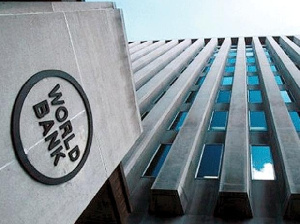FG seeks fresh $300m health security loan from World Bank

Information obtained from the World Bank showed that the loan, which is under consideration, will be implemented by the Nigeria Centre for Disease Control with the Federal Ministry of Finance acting as borrower on behalf of the Federal Government.
According to information on the World Bank website, the loan project is expected to “increase regional collaboration and health system capacities to prevent, detect, and respond to health emergencies in the Federal Republic of Nigeria.”
The project is currently in the pipeline stage, with the disclosure date scheduled for February 6, 2025.
The World Bank board is expected to give its approval on July 30, 2025, following necessary assessments. The appraisal is set for April 14, 2025, and implementation will commence in the 2026 fiscal year.
According to a document on the concept of environmental and social review seen by The PUNCH on Friday, the Nigeria Health Security Programme aligns with broader government efforts to enhance disease surveillance, diagnostic capabilities, emergency response, and laboratory networks across the 36 states and the Federal Capital Territory.
The programme’s primary objective is to enhance regional collaboration and strengthen Nigeria’s health systems to deal with emergencies. It falls within the World Bank’s investment in health, nutrition, and population sectors across Western and Central Africa.
According to the Environmental and Social Review Summary of the project, HeSP will expand molecular laboratory capacity, upgrade primary healthcare centres, establish emergency operation centres, and construct warehouses.
It will also deploy mobile laboratories and install water, sanitation, and hygiene facilities alongside solar energy systems to support health infrastructure improvements.
Although the total project cost is yet to be determined, the World Bank has committed $300m to the initiative. The funds aim to bolster Nigeria’s pandemic preparedness and improve response mechanisms for public health threats.
The initiative comes as Nigeria strengthens its public health infrastructure following lessons from previous outbreaks, including COVID-19. If approved, the loan will support the NCDC in improving disease surveillance, diagnostics, emergency response, and laboratory services.
Nigeria has previously secured funding from international financial institutions to boost healthcare resilience, including financing for vaccine procurement, emergency medical services, and infrastructure development.
However, the project, categorised as a high-priority public health intervention, carries substantial environmental and social risks due to potential health, safety, and ecological concerns associated with infrastructure expansion.
Identified risks include increased medical waste, occupational hazards, and heightened energy and water demands. Social risks range from potential grievances from stakeholders to concerns over land acquisition and implementing health interventions in conflict-prone areas.
The PUNCH earlier reported that the Federal Government was engaging the World Bank for two fresh loans totalling $580m, which are expected to be approved in March 2025.
The projects, Accelerating Nutrition Results in Nigeria 2.0 and HOPE for Quality Basic Education for All, are expected to receive final approvals on March 27 and March 20, 2025, respectively.
The HOPE for Quality Basic Education for All programme has a commitment of $552.18m, with $500m coming from the World Bank and an additional $54m from other sources.
The second loan project, the Accelerating Nutrition Results in Nigeria 2.0 project, is expected to secure $80m from the World Bank to address malnutrition and food insecurity.
The PUNCH further observed that the Federal Government, under the leadership of President Bola Tinubu, has secured loans worth $6.95bn from the World Bank in about 18 months. Not less than 10 loan projects have been approved by the World Bank under the current administration.
According to data from the external debt report released by the Debt Management Office, the World Bank’s share of Nigeria’s debt totals $17.32bn, with the majority owed to the International Development Association, which accounts for $16.84bn, representing 39.14 per cent of Nigeria’s total external debt.
The International Bank for Reconstruction and Development, another arm of the World Bank, is owed $485.08m, or 1.13 per cent.
The PUNCH earlier reported that the Federal Government spent $3.58bn servicing its foreign debt in the first nine months of 2024, representing a 39.77 per cent increase from the $2.56bn spent during the same period in 2023.
This was according to data from the Central Bank of Nigeria on international payment statistics. The significant rise in external debt service payments shows the mounting pressure on Nigeria’s fiscal balance amid ongoing economic challenges.
The World Bank, in its recent International Debt Report, revealed that developing nations spent an unprecedented $1.4tn on foreign debt servicing in 2023, driven by a surge in interest rates to their highest levels in 20 years.
Interest payments alone reached $406bn, a nearly 30 per cent increase from the previous year, severely impacting spending in critical sectors such as health, education, and environmental programmes.
According to the report, the most vulnerable economies, those eligible for loans from the World Bank’s International Development Association, bore the brunt of the financial strain.
In a recent statement, the Federal Government reaffirmed its commitment to reducing reliance on external debt financing and driving economic independence through strategic partnerships with the World Bank.
The Minister of Finance and Coordinating Minister of the Economy, Mr Wale Edun, made this known during a meeting with the World Bank Executive Director, Dr Zainab Shamsuna Ahmed, where he outlined Nigeria’s shift towards private sector-led growth.
The statement read, “Edun emphasised that President Tinubu remains focused on strengthening Nigeria’s economic foundation, reducing dependency on external borrowing, and ensuring long-term, private-sector-led development.”
Edun acknowledged the critical role played by the World Bank in Nigeria’s development but stressed that the government is prioritising a business-friendly environment to attract sustainable investments
Source: www.punchng.com





